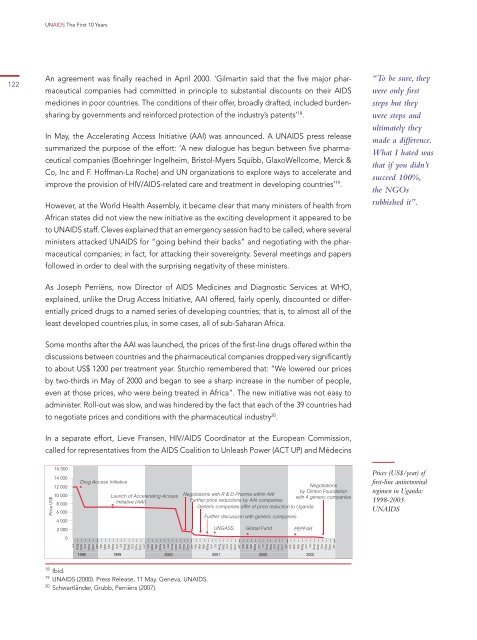UNAIDS: The First 10 Years
UNAIDS: The First 10 Years
UNAIDS: The First 10 Years
You also want an ePaper? Increase the reach of your titles
YUMPU automatically turns print PDFs into web optimized ePapers that Google loves.
JulAug AugSep SepOct OctNov NovDec DecJanJanFeb FebMar MarApr AprMay MayJun JunJul JulAug AugSep SepOct OctNov NovDec DecJanJanFeb FebMar MarApr AprMay MayJun JunJul JulAug AugSep SepOct OctNov NovDec DecJanJanFeb FebMar MarApr AprMay MayJun JunJul JulAug AugSep SepOct OctNov NovDec DecJan JanFeb FebMar MarApr AprMay MayJun JunJul JulAug AugSep SepOct OctNov NovDec DecJan JanFeb FebMar MarApr AprMay MayJun JunJul JulAug AugSep SepOct OctNov NovDec DecJan Jan<strong>UNAIDS</strong> <strong>The</strong> <strong>First</strong> <strong>10</strong> <strong>Years</strong>122An agreement was finally reached in April 2000. ‘Gilmartin said that the five major pharmaceuticalcompanies had committed in principle to substantial discounts on their AIDSmedicines in poor countries. <strong>The</strong> conditions of their offer, broadly drafted, included burdensharingby governments and reinforced protection of the industry’s patents’ 18 .In May, the Accelerating Access Initiative (AAI) was announced. A <strong>UNAIDS</strong> press releasesummarized the purpose of the effort: ‘A new dialogue has begun between five pharmaceuticalcompanies (Boehringer Ingelheim, Bristol-Myers Squibb, GlaxoWellcome, Merck &Co, Inc and F. Hoffman-La Roche) and UN organizations to explore ways to accelerate andimprove the provision of HIV/AIDS-related care and treatment in developing countries’ 19 .However, at the World Health Assembly, it became clear that many ministers of health fromAfrican states did not view the new initiative as the exciting development it appeared to beto <strong>UNAIDS</strong> staff. Cleves explained that an emergency session had to be called, where severalministers attacked <strong>UNAIDS</strong> for “going behind their backs” and negotiating with the pharmaceuticalcompanies; in fact, for attacking their sovereignty. Several meetings and papersfollowed in order to deal with the surprising negativity of these ministers.“To be sure, theywere only firststeps but theywere steps andultimately theymade a difference.What I hated wasthat if you didn’tsucceed <strong>10</strong>0%,the NGOsrubbished it”.As Joseph Perriëns, now Director of AIDS Medicines and Diagnostic Services at WHO,explained, unlike the Drug Access Initiative, AAI offered, fairly openly, discounted or differentiallypriced drugs to a named series of developing countries; that is, to almost all of theleast developed countries plus, in some cases, all of sub-Saharan Africa.Some months after the AAI was launched, the prices of the first-line drugs offered within thediscussions between countries and the pharmaceutical companies dropped very significantlyto about US$ 1200 per treatment year. Sturchio remembered that: “We lowered our pricesby two-thirds in May of 2000 and began to see a sharp increase in the number of people,even at those prices, who were being treated in Africa”. <strong>The</strong> new initiative was not easy toadminister. Roll-out was slow, and was hindered by the fact that each of the 39 countries hadto negotiate prices and conditions with the pharmaceutical industry 20 .In a separate effort, Lieve Fransen, HIV/AIDS Coordinator at the European Commission,called for representatives from the AIDS Coalition to Unleash Power (ACT UP) and MédecinsPrice US$16 00014 00012 000<strong>10</strong> 0008 0006 0004 0002 0000Drug Access InitiativeLaunch of Accelerating AccessInitiative (AAI)Negotiationsby Clinton Foundationwith 4 generic companiesFurther price reductions by AAI companiesGeneric companies offer of price reduction to UgandaNegotiations with R & D Pharma within AAIFurther discussion with generic companiesUNGASS Global FundPEPFARl l l l l l l l l l l l l l l l l l l l l l l l l l l l l l l l l l l l l l l l l l l l l l l l l l l l l l l l l l l l l l l l l l lPrices (US$/year) offi rst-line antiretroviralregimen in Uganda:1998-2003.<strong>UNAIDS</strong>19981999 20002001 2002200318Ibid.19<strong>UNAIDS</strong> (2000). Press Release, 11 May. Geneva, <strong>UNAIDS</strong>.20Schwartländer, Grubb, Perriëns (2007).
















